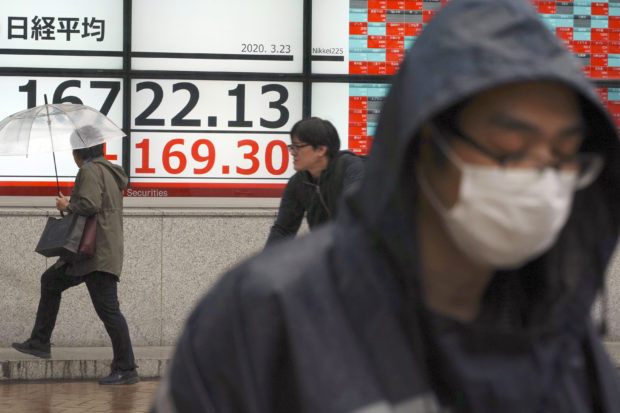Asian shares, US futures sink as virus crisis deepens
BANGKOK — U.S. futures dropped 4% and Australia’s share benchmark initially plunged 8.5% as work on more stimulus for the U.S. economy hit snags in the U.S. Senate.

People walk in the rain past an electronic stock board showing Japan’s Nikkei 225 index at a securities firm in Tokyo Monday, March 23, 2020. Shares dropped in Hong Kong and South Korea early Monday. However, Japan’s Nikkei 225 index held steady, gaining 0.8% on news the International Olympic Committee plans to discuss potentially changing the timing of the Tokyo Games, due to begin in July. (AP Photo/Eugene Hoshiko)
India’s Sensex plummeted 9.4%. Singapore’s benchmark plunged 7.3% after the city announced a sharp increase in confirmed infections and its first two deaths.
Shares initially dropped more than 4% in Hong Kong and fell 5% in South Korea. The Shanghai Composite index lost 1.6%.
However, Japan’s Nikkei 225 index held steady, gaining 1.9% by midday Monday. Investors appeared to be encouraged by the likelihood the International Olympic Committee might postpone, rather than scrap, the Tokyo Games.
Japan’s Prime Minister Shinzo Abe acknowledged that a postponement could be unavoidable as Canada and Australia added to the immense pressure that has been mounting on organizers by saying they wouldn’t send athletes to Tokyo unless the Olympics are postponed for a year.
In the U.S., top-level negotiations between Congress and the White House continued after the Senate voted against advancing the nearly $2 trillion economic rescue package. Another vote was expected Monday.
The Democrats said the bill was tilted too much toward aiding corporations and would not do enough to help individuals and healthcare providers.
Article continues after this advertisementBy 9 p.m. EST, the S&P 500 future contract was down 3.6% at 2,204.60. The future for the Dow dropped 4.1% to 18,258.00.
Article continues after this advertisementMarkets reopened to an altered business landscape as lockdowns and closures intended to halt the spread of the new coronavirus expanded over the weekend to include many cities around the world and the number of people infected surged past 335,000.
“Risk aversion appears here to stay as investors become more fearful that this could be the worst global recession during peacetime,” Edward Moya of Oanda said in a commentary.
“Every passing day it seems lockdown efforts are intensified globally thus it seems financial markets will remain nervous until we see the infection rate improve in both the U.S. and Europe,” Moya said.
Sydney’s S&P/ASX 200 was trading 4.9% lower at 4,582.50 after plunging sharply just after the open. Australia announced at 66.4 billion Australian dollar ($38.5 billion) stimulus package on Sunday. That’s in addition to an earlier mandated $10 billion package and other stimulus from the central bank.
South Korea’s Kospi lost 3.9% to 1,504.93. Hong Kong’s Hang Seng index shed 3.8%, to 21,940.30.
The Nikkei was at 16,874.77.
Stocks fell sharply on Wall Street and the price of oil sank again Friday as New York became the latest state to mandate that nearly all workers stay home to limit the spread of the coronavirus. California and several other states in the U.S. and a growing number of countries have also imposed limits on business activity.
The S&P 500 lost 4.3% to 2,304.92 on Friday while the Dow skidded 4.6% to 19,173.98. The Nasdaq composite index lost 3.8% to 6,879.52.
This week will bring fresh data that are likely to underscore the damage to economies from the outbreak of the virus that originated in China.
A sharp surge in cases and in deaths across the region, especially in Southeast Asia, have also raised the level of alarm.
Shutdowns mean less demand for oil. U.S. crude has dropped about 21%, moving below $20 a barrel last week for the first time since February 2002. However, on Monday benchmark crude was up 10 cents at $22.73 per barrel in electronic trading on the New York Mercantile Exchange.
Brent crude, the international standard, dropped 78 cents to $26.20 per barrel.
Sweeping shutdowns in many countries and resulting layoffs raise the spectre of a global recession.
Ultimately, investors say they need to see the number of new infections stop accelerating for the market to end its prolonged, bouncing tumble to lows not seen for over a decade.
The S&P 500, the benchmark for many index funds held in retirement accounts and the measure preferred by professional investors, is down 31.1% since reaching a record high a month ago. Last week marked its biggest weekly loss since October 2008 during the global financial crisis.
Investors have continued to seek safety in U.S. government bonds, driving their yields broadly lower. The 10-year Treasury yield, which influences interest rates on mortgages and other consumer loans, slid to 0.81% early Monday from 0.94% late Friday.
At nearly $2 trillion, the U.S. rescue package is the biggest effort yet to aid households and shore up the U.S. economy, the world’s biggest.
But scores of other governments and many central banks have acted as they try to stave off or at least alleviate the impact of a recession.
As investors scramble for cash, demand for the U.S. dollar has been soaring. The dollar was at 110.12 Japanese yen on Monday, down from 110.83 yen late Friday.
The euro rose to $1.0729 from $1.0697.
More than 14,400 people have died of the coronavirus worldwide, while nearly 100,000 people have recovered.
For most people, the coronavirus causes only mild or moderate symptoms, such as fever and cough, and those with mild illness recover in about two weeks.
Severe illness including pneumonia can occur, especially in the elderly and people with existing health problems, and recovery could take six weeks in such cases.